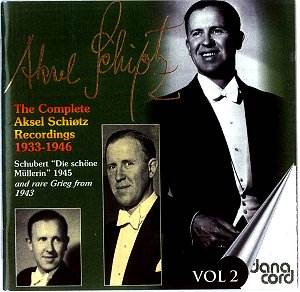I refer readers to my review
of Vol. 1 of this major series for a brief biographical sketch of
the Danish tenor Aksel Schiøtz. Vol. 2 immediately goes to the
heart of things with one of the major recordings on which Schiøtz’s
reputation stands, the 1945 Müllerin with Gerald Moore.
A recording of this cycle was begun in 1939-40, accompanied
by Herman D. Koppel who, being Jewish, fled to Sweden in 1940. Due to
this and to the Danish people’s understandably strong feelings against
the German language in those years the project, like Schiøtz’s
own international career, was put on hold. Also in 1939, Schiøtz
had recorded the first and eighth songs of the cycle in London with
Gerald Moore so it was entirely apt that in 1945 he was rushed onto
a military aeroplane and became the first singer to sing German lieder
on the BBC after the war. The chosen work was Die schöne Müllerin,
which he then recorded for HMV. The 1939-40 recordings comprise
half the cycle (8 songs with Koppel plus the two with Moore) and are
included in Vol. 4. I hope to compare the different versions in due
course.
Detailed comment is hardly necessary at this stage.
This recording has always represented an ideal for a certain type of
interpretation. Firstly, for the use of a fresh-sounding, light tenor
(the songs are all sung in the original keys), emphasising the youthful
innocence of the protagonist. Secondly, for a basically non-interventionist
approach. Non-interventionist is not a synonym for unimaginative, at
least not in this case; it is sufficient to hear how the singer differentiates
between the several stanzas in the first song. All the strophic songs,
in fact, are worth studying as examples of just what can be done to
vary such pieces by vocal colouring rather than by pulling them about.
The young man’s progress from green innocence to a delusion and despair
with which he cannot cope are charted by vocal and verbal colouring,
without any hint of the hysterical ranting which interpreters of a different
kind have seen fit to apply. The brook’s final lullaby, ironically assuaging
in view of the fact that the damage has now been done, is moving in
the extreme (as a concession to 78 side-lengths, the fourth stanza is
omitted).
Moore for his part provides the ideal backdrop. The
earlier songs are pervaded by the trickling waters of the brook, followed
by apparent calm as the young man ceases his journeying to take employment
at the mill, rising to drama as he realises the girl’s indifference
and moves on again. There has been a tendency of late to take Gerald
Moore too much for granted. He laboured long and well to have the profession
of piano accompanist recognised on the same level of dignity as that
of piano soloist, but more recently it has become common to prefer,
for instance, to Fischer-Dieskau’s records with Moore, later ones using
pianists who are primarily soloists or conductors. Let us remember that
Moore was a great pianist in his own right, and let us reflect what
an art it takes to accompany with equal success such very different
interpreters of the same music as Schiøtz and Fischer-Dieskau.
And let us also remember that the professional accompanist has to be
able to play all this repertoire in a wide variety of keys (I know most
songs are published in at least two keys, but many singers find themselves
most comfortable in another key again). Has the solo pianist ever thought
how much more complicated his life would be if he had to be able to
transpose all his Beethoven sonatas up and down according to the occasion?
Reservations? These are the same as I expressed over
the first volume. Among many high notes which are perfectly placed,
there is an occasional sense of strain. Schiøtz’s vocal chords
were by now compromised by cancer and the operation which would effectively
end his career was only a year off. I shall compare the 1939-40 recordings
from this point of view with great interest. Also, the slight trace
of a downward portamento (hear the first phrase of the brook’s lullaby)
continues not to be to my taste; again, I shall be interested to see
whether this habit is present in his earlier recordings, and to what
extent.
The Grieg songs, recorded for the composer’s centenary,
are put across with much freshness. The op. 33 songs came my way recently
in Vol. 4 of Monica Groop’s survey (BIS-CD-1257). While generally admiring
her singing I queried her tendency to adopt at times a note-by-note
approach where a more legato line might be expected. However, I made
this comment with some diffidence, wondering whether the nature of the
Norwegian language imposed this manner of singing. The notes here comment:
"The Vinje poems are originally in the poet’s own characterful
dialect. Schiøtz sings them in Danish softer grammar." So,
while noting that Schiøtz provides the legato line I missed in
Groop, I still do not know whether she has some linguistic justification
for what she does.
The booklet not only provides much information about
Schiøtz and the recordings, it also includes the singer’s own
detailed comments on how to interpret the Schubert cycle, written in
1970. If you are not troubled by a recording which is obviously not
recent – but the voice reproduces well and the piano, if lacking in
range, is mellow – this recording still has claims to be a first choice.
Certainly, all who care about Schubert and lieder singing should have
it.
Christopher Howell
